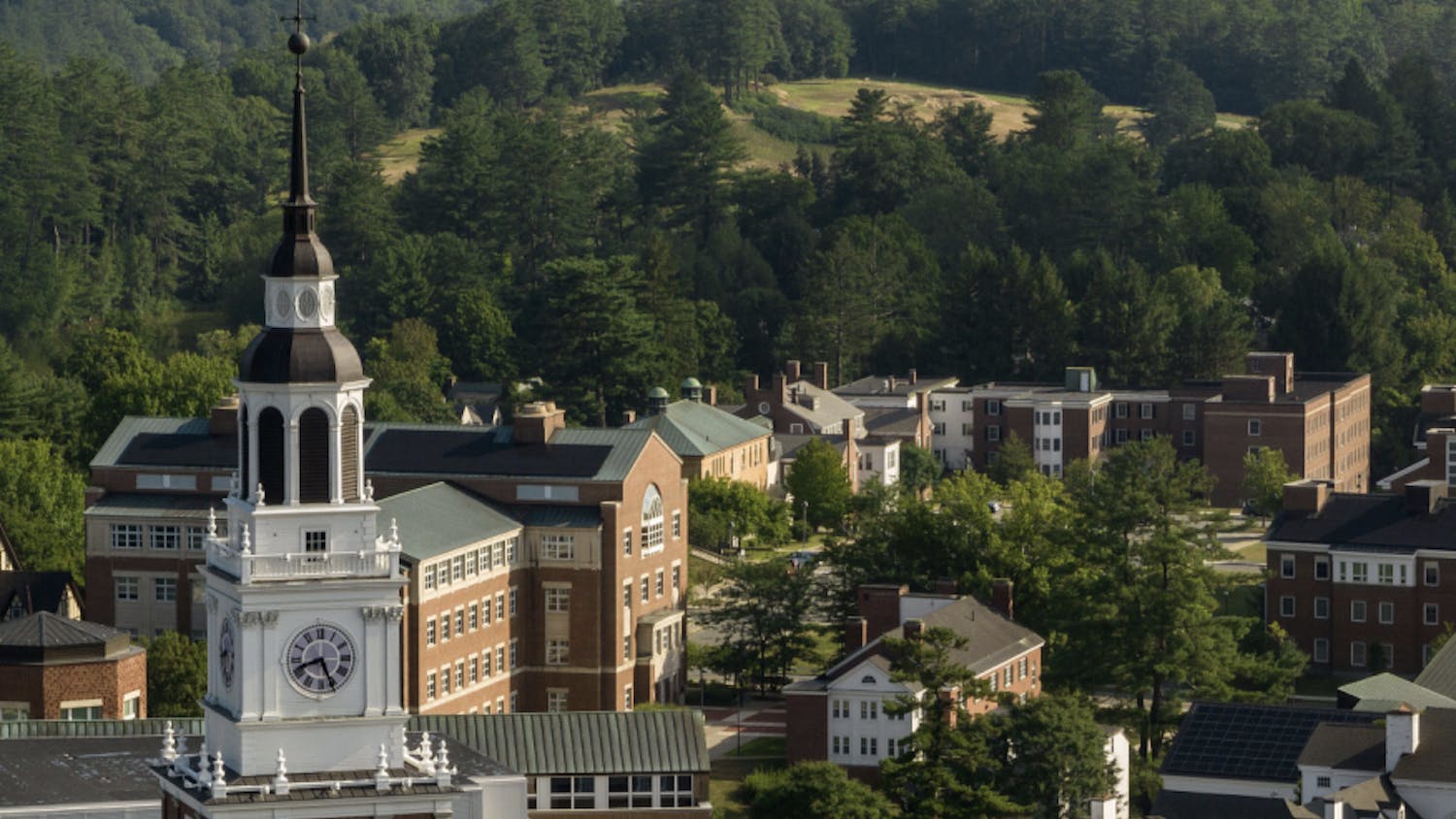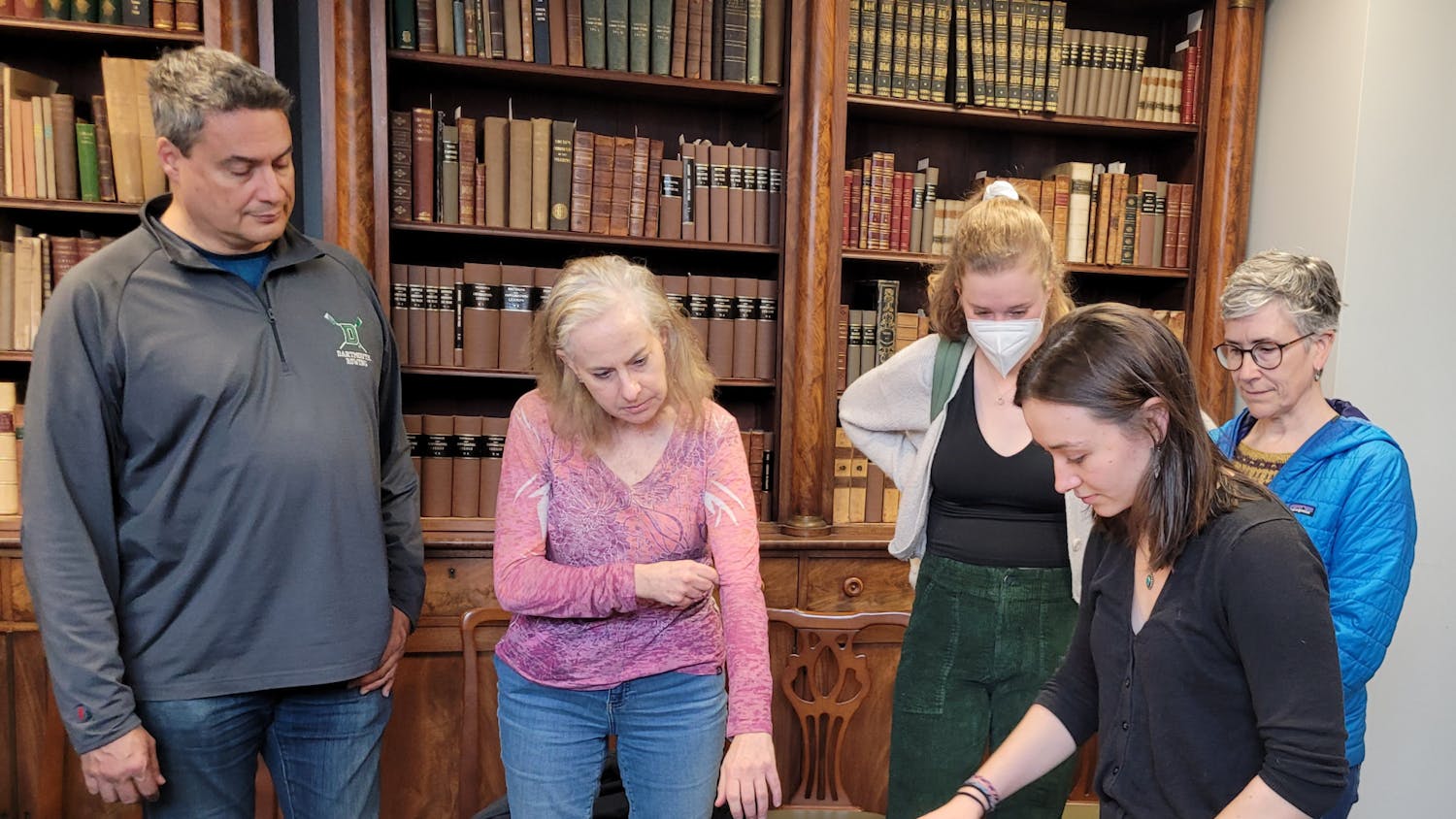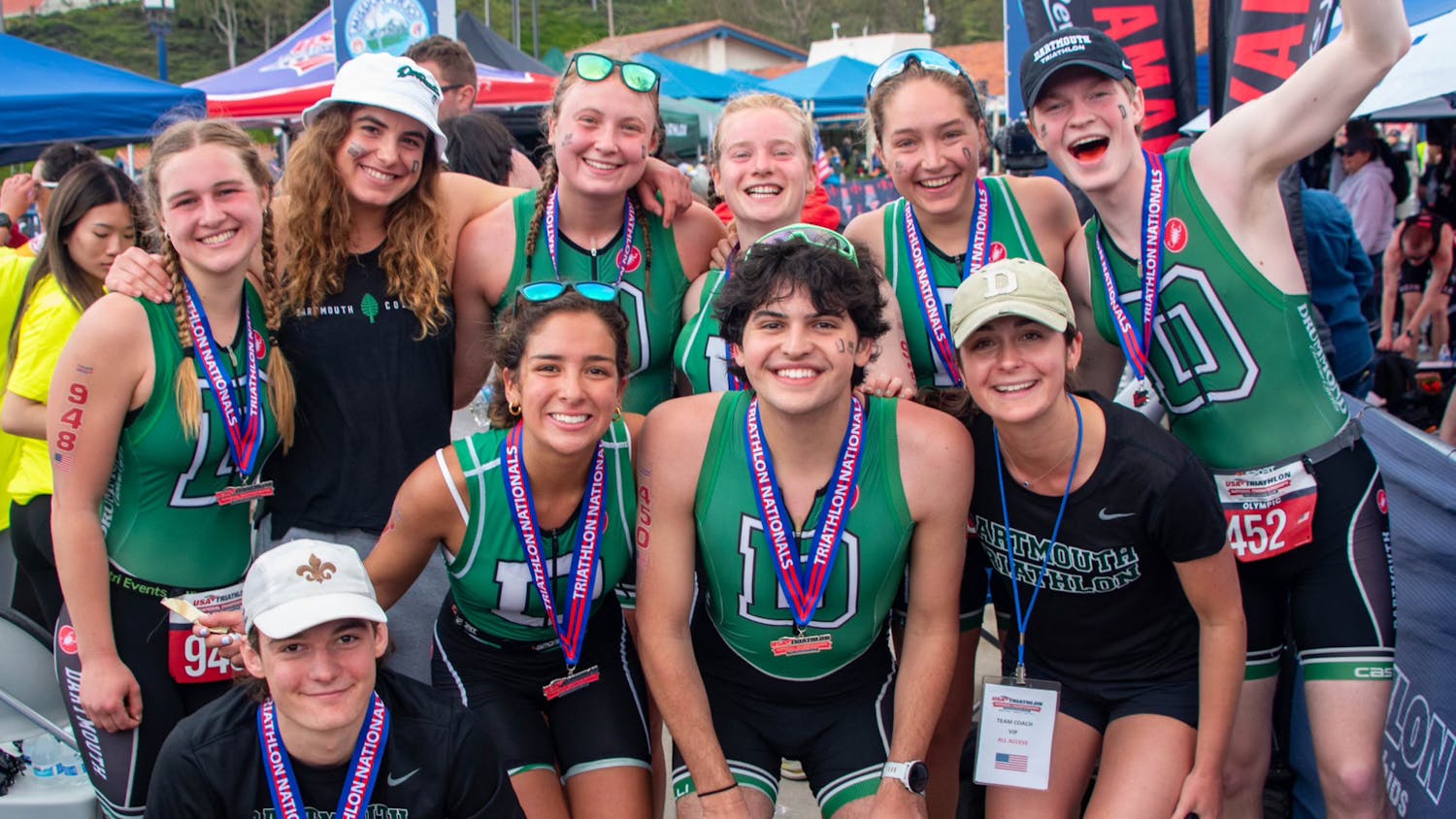Last weekend, red, orange, green, blue and purple lights brightened the front of Dartmouth Hall in honor of PRIDE 2017. The 11th annual Dartmouth PRIDE week concluded on Friday with the annual Lavender Graduation, an event celebrating graduating students and individuals who have contributed to the LGBTQIA+ community on campus.
For the second year in a row, PRIDE lasted two weeks instead of one, starting on April 22 and ending on May 5.
This year’s PRIDE theme was “Queer & _____.” Director of the Office of Pluralism and Leadership Reese Kelly wrote in an email that the blank line acknowledges the vast diversity of experiences, identities, histories and politics that can be rendered invisible when an individual is reduced to the label “queer.”
This year’s PRIDE chair Emily Levine ’19 said that this year’s celebration tried to focus more on intersectionality to give a voice to students to discuss being queer while having other identities. She said the PRIDE committee tried to integrate the theme of “Queer & _____” into every event, to go beyond the lesbian and gay aspects of LGBTQIA+ because intersections of identities transcend the binaries of being straight or gay to include bisexuality, pansexuality, asexuality and other identities.
PRIDE fundraising committee member Seungjae Hong ’20 said he thought the goal of PRIDE was to show that there is a range of queer students at the College. He said that a lot of the events focused on the intersectionalities of queer identity to show that there is not one stereotype, experience or being that defines a queer student here.
“A lot of times at Dartmouth, it is easy to get lost in the details,” Hong said. “We all say that we are a small school, and sometimes we get lost in the crowd and put up a face. I appreciated that people opened up and showed a little more about themselves.”
Member of the PRIDE finance and outreach committee Simon Ellis ’20 said that the theme this year explored the idea of intersectionalities and differences in how sexual identities relate to things like gender, class and race.
“This year, we are trying to get across that repetitious celebrations of queer PRIDE like PRIDE are great, but that we don’t want to get stuck in the problematic trap that we are celebrating the same thing year in and year out,” Ellis said. “Every year, we want to focus on something different and highlight the fact that there is no one queer narrative regardless of how someone identifies.”
Ellis said the events were targeted for audiences that may have been previously overlooked. He said PRIDE and OPAL recognize that they normally advertise the face of the “gay white guy” as the face of PRIDE, and they wanted to move away from that.
Ellis explained a new event called “Beyond the LG” which focused on “allyship”, what it means to be an ally and identities outside the realm of being gay or lesbian. Annual events included a drag show, Lavender Graduation and Transform, a fashion show during which people challenge traditional gender norms.
Levine, who was a social-co-chair of PRIDE last year, said that this year, there was a concerted effort to reduce the number of PRIDE week events — for PRIDE 2016, there were 28 events, eight of which were annual cornerstone events such as Transform and the Lavender Graduation. Levine said not everyone is comfortable going to every event and people are comfortable in different spaces, so last year’s committee tried to make sure PRIDE week’s events were accessible and available to everyone. However, they reduced the number of events to 13 this year to focus more attention on specific events.
“Last year’s PRIDE was an extremely crowded couple of weeks in the midterm and not a lot of people are going to want to go to 28 events within two weeks,” Levine said. “We were trying to narrow that down for the sake of convenience and to gain more exposure and attendance and to put more meaning into each event rather than throwing a bunch in there.”
Levine said that this year’s PRIDE week faced fewer budget issues than the previous year, because the fundraising committee received more donations from academic departments, professors and Greek letter organizations. She said that a few houses and departments were very supportive of PRIDE, but there are always budget issues because the College does not give a lot of money to events like PRIDE.
“I do not think that enough money is going towards events focusing on social justice and celebration of people’s identity and focus on people’s mental health,” Levine said. “I don’t think the administration at Dartmouth necessarily focuses on identity-related issues which is why we will always have budget problems.”
Hong said that he had to ask many different departments and organizations for donations to ensure all the events could happen.
“There was a ton of frustration with how many layers of bureaucracy there are at Dartmouth,” Hong said. “Sometimes it felt like there were roadblocks on the way and our biggest challenge was getting money from the [Special Programs and Events Committee] funding board, where the majority [of] our money was coming from.”
Ellis said that any group on campus seeking funding will encounter difficulties, which was especially true for PRIDE week because it lasted for two weeks and because SPEC funding is typically for single events.
“The largest challenge has been trying to explain to people that PRIDE is a two-week celebration and justifying the prices for a two-week model versus one event that celebrates Dartmouth PRIDE,” Ellis said.
Levine said that another challenge PRIDE faced this year was outreach, because the queer community is not extremely visible to mainstream student culture or even to queer students. She said that because PRIDE is one of the only times of the year when queer identities are acknowledged, students are not used to discussing such topics.
Levine added that people could have not attended events due to midterms, but that a lot of people may be scared or feel awkward about going to an event, as they can be especially anxiety-inducing for queer students who are not yet out to others or even themselves.
Hong said the queer community at the College is fragmented because there are some segments that don’t interact with each other. He expected the PRIDE committee to be more homogenous but was pleasantly surprised to see its diversity.
Ellis believes the College does a decent job at creating queer spaces on campus, but that every college can always improve.
“There are a lot of resources that queer students don’t always see or don’t utilize all the time [at the College],” Ellis said. “The responsibility to create queer spaces should not fall on the administration or non-queer students, and it has to be found within the existing queer student population at Dartmouth.”
Levine said that she thinks social spaces at the College are extremely heteronormative and that there aren’t many open queer relationships because they are stigmatized.
“There are social spaces like Amarna, Panarchy and gender-inclusive Greek houses that are catered towards queer people,” Levine said. “I think that Dartmouth does a good job of trying to be inclusive of queer identities because there are at least normal spaces for being queer.”



